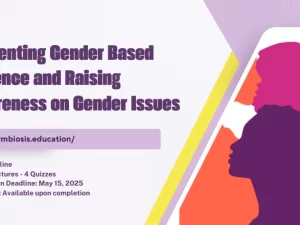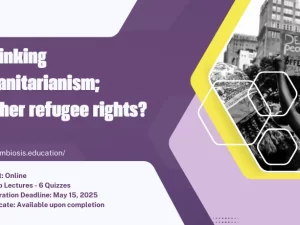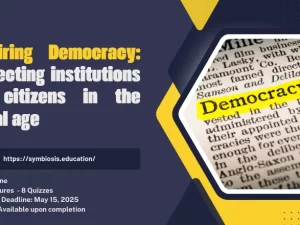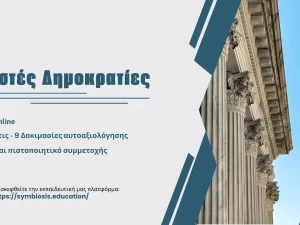Democracy and the Environment
- Description
- Curriculum

This course invites participants to explore the critical intersection of democracy, climate change, and environmental governance. As environmental crises intensify and public trust in democratic institutions weakens, pressing questions arise about the ability of democratic systems to deliver effective, inclusive, and timely responses. Through expert presentations, the course explores how power is distributed in environmental decision-making, what responsibilities different actors hold, and how democratic values can be upheld in the face of urgent ecological threats.
Focusing on the intersection of environmental policy, sustainability, and democratic accountability, the course explores key themes such as the balance between public and private actors, the role of local partnerships, and the development of resilient, inclusive communities. Drawing on real-world cases, the course highlights the links between climate action, human rights, and democratic participation. By engaging critically with these themes, participants sharpen their understanding of the political dimensions of the environmental crisis and gain the tools to envision democratic pathways toward a just and sustainable future.
Learning Outcomes
Upon completion of the course, participants will have a nuanced understanding of:
-
Concepts related to the interconnection between democracy and the politics of climate change
-
Debates surrounding climate policy and climate justice
-
Key social and political dimensions of climate change and democratic governance at multiple levels
-
The contextual approach to environmental democracy
-
1Ecological vs. Environmental Democracy – The way forward?
This lesson examines the link between ecological thinking and democratic governance. It explores how environmental democracy can adapt to complex realities, emphasizing the need for practical solutions, global cooperation, and protection of quality of life—both offline and online.
-
2Quiz
-
3People power for climate action
This lesson explores how democratic systems can drive stronger climate action by enabling public participation, accountability, and legal tools such as public interest litigation. It highlights the connection between democratic governance and positive environmental outcomes, emphasizing the role of marginalized communities in defending nature. Participants examine how democratization and decarbonization reinforce each other, leading to more inclusive and effective climate policies.
-
4Quiz
-
5Can democracy save the climate? the case of climate legislation
Effective climate laws are more than policy tools—they are frameworks that shape long-term governance, accountability, and citizen participation. This lesson examines how climate legislation across Europe is evolving to support the transition to climate neutrality. It highlights key features of successful laws, including cross-party consensus, evidence-based processes, transparent monitoring, and structured public engagement.Real-world examples from Ireland and France demonstrate how inclusive approaches can lead to stronger, more legitimate climate action—anchoring environmental progress in democratic values and public trust.
-
6Quiz
-
7Environmental Democracy is the only way to Save the Environment
Grounded in a rights-based approach, this lesson introduces environmental democracy as an essential framework for effective and inclusive environmental protection. It explores three core pillars—access to information, public participation, and access to justice—and examines how they empower communities to influence decisions about land, resources, and climate policy.
-
8Quiz
-
9Democracy is More Efficient in Fighting Climate Change
This lesson examines how democracy can drive effective climate action through informed public engagement. It highlights the role of media, education, and creative tools in building trust in science and raising awareness. Emphasis is placed on education as the strongest long-term link between democratic values and environmental responsibility.
-
10Quiz
-
11Why rethinking housing can help us save the environment?
This lesson explores housing as a key driver of environmental and social transformation. It shows how sustainable, affordable housing—when linked with urban planning and public infrastructure—can reduce emissions, combat exclusion, and improve daily life.
-
12Quiz
-
13On the political economy of climate and energy policy
This lesson examines how power, interests, and governance shape climate and energy policy. It explores the dynamics behind public support, the influence of special interests, and the political trade-offs involved in transitioning to a low-carbon economy. Key questions include who benefits from policy decisions, how vested interests resist change, and what this means for democratic systems. The lesson highlights the need for strong institutions, public engagement, and transparent governance to ensure that climate action is both effective and equitable.
-
14Quiz





